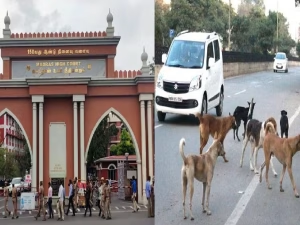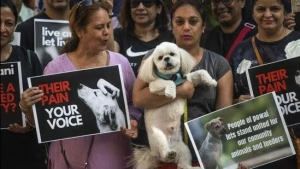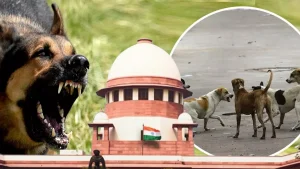Tamil Nadu – The Madras High Court Stray Dog Order under consideration by the Madurai Bench represents a potential watershed moment for stray animal management in Tamil Nadu. This developing judicial directive could fundamentally reshape how the state addresses the growing challenge of street dog populations and public safety concerns.
Court Proceedings and Multiple Petitions

The Madras High Court Stray Dog Order emerged from comprehensive hearings conducted by the Madurai Bench on Tuesday, where judges examined a diverse batch of petitions addressing various stray animal issues. The court simultaneously addressed three distinct but interconnected concerns: stray cattle management, general street dog populations, and specific incidents involving dogs within temple premises that had allegedly attacked devotees.
The temple-related petition highlighted particularly concerning circumstances where dogs had bitten worshippers, causing physical injuries and generating widespread fears about potential rabies transmission. These incidents underscored the urgent need for systematic intervention that the Madras High Court Stray Dog Order aims to address.
During these proceedings, the Bench announced its intention to study the Supreme Court’s detailed guidelines for Delhi’s street dog management program. This comprehensive review will inform the final Madras High Court Stray Dog Order and ensure alignment with established legal precedents while addressing Tamil Nadu’s specific challenges.
Alarming Statistics Drive Judicial Action
The Madras High Court Stray Dog Order consideration was significantly influenced by disturbing data presented during the hearings. Petitioners submitted evidence indicating that Tamil Nadu has already recorded an staggering 3.67 lakh dog bite incidents during the current year alone. More critically, these statistics revealed 20 fatalities directly attributed to dog-bite-related rabies infections.
These numbers represent a public health crisis that demands immediate attention through the Madras High Court Stray Dog Order. The scale of the problem extends beyond isolated incidents, suggesting systemic failures in current stray dog management protocols across multiple districts throughout the state.
The judicial response reflects growing recognition that existing measures have proven inadequate to protect public safety while managing street dog populations humanely. The Madras High Court Stray Dog Order represents an attempt to bridge this gap through court-mandated protocols.
Animal Welfare Activists Express Concerns
The potential Madras High Court Stray Dog Order has generated significant anxiety among animal welfare advocates who fear inadequate implementation could harm vulnerable dog populations. These activists highlight critical infrastructure deficiencies that could undermine any court directive.
Specific concerns include insufficient manpower, limited veterinary expertise, and inadequate facilities to handle Tamil Nadu’s substantial street dog population. Animal welfare representatives argue that the Madras High Court Stray Dog Order should prioritize humane solutions rather than potentially harsh enforcement measures.
“Dogs have equal rights to live in this world,” stated one prominent activist, emphasizing the need for balanced approaches that protect both human and animal welfare. These advocates worry that poorly executed directives stemming from the Madras High Court Stray Dog Order could result in thousands of dogs being neglected or facing starvation.
Instead of punitive measures, animal welfare groups urge the court to ensure rigorous enforcement of existing Animal Birth Control (ABC) programmes. These initiatives focus on sterilization and vaccination as scientifically proven, humane solutions for managing street dog populations effectively.
Public Support for Decisive Action

Conversely, many residents and civic activists have welcomed the Madras High Court Stray Dog Order development, emphasizing that human life must take precedence in policy considerations. These supporters argue that the escalating number of both fatal and non-fatal dog attacks necessitates immediate, decisive judicial intervention.
“Lives should not be lost to dog bites in this day and age,” declared one petitioner, highlighting the absence of coordinated rabies control measures across several districts. This perspective views the Madras High Court Stray Dog Order as essential protection for public safety.
Supporters point to the statistical evidence presented during hearings as justification for comprehensive action. They argue that current approaches have failed to prevent the alarming increase in dog-related incidents and fatalities recorded throughout Tamil Nadu.
Supreme Court Guidelines Framework


The Madras High Court Stray Dog Order will likely incorporate established Supreme Court guidelines developed for Delhi’s street dog management program. This framework provides tested protocols that balance animal welfare considerations with public safety requirements.
The Delhi guidelines offer comprehensive approaches addressing municipal responsibilities, sterilization drive coordination, shelter management standards, and public awareness campaign implementation. Adapting these proven strategies through the Madras High Court Stray Dog Order could provide Tamil Nadu with effective tools for addressing its stray dog challenges.
Expected Policy Implications
The forthcoming Madras High Court Stray Dog Order could establish state-wide protocols affecting multiple aspects of stray animal management. Municipal authorities may receive specific mandates regarding their responsibilities for street dog population control and public safety measures.
Potential changes include enhanced sterilization programs, improved shelter facilities, coordinated rabies prevention initiatives, and comprehensive public education campaigns. The Madras High Court Stray Dog Order may also establish accountability mechanisms ensuring consistent implementation across different districts.
Conclusion and Future Directions
The Madras High Court Stray Dog Order represents a critical juncture for Tamil Nadu’s approach to balancing animal welfare with public safety concerns. The Bench’s commitment to reviewing Supreme Court guidelines suggests a thoughtful, evidence-based approach to developing comprehensive solutions.
As judges prepare to issue their final directions, stakeholders across the spectrum await clarity on how the state will address the complex challenges posed by street dog populations. The ultimate success of any directive will depend on adequate resource allocation, professional implementation, and ongoing monitoring to ensure both human and animal welfare protection.

